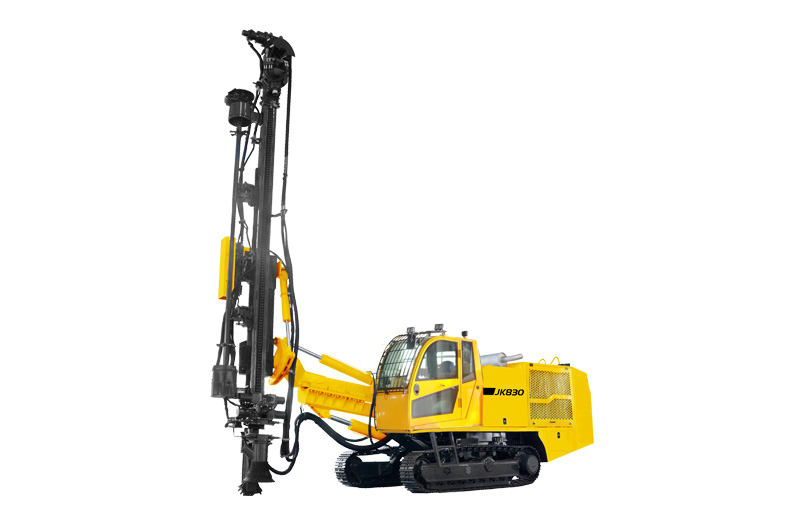Introduction For Down-The-Hole Drilling Method
A down-the-hole drill, usually called DTH Drilling Rig, is basically a mini jackhammer screwed on the bottom of a drill string. The speedy hammer activity breaks hard stone into little flakes and dust and can be dismissed evident by the air exhaust in the DTH hammer. Considering that the DTH method was initially designed to drill large-diameter holes in surface-drilling software, its title originated in the fact that the percussion mechanism adopted down the bit to the gap. Programs were afterward discovered for the DTH process underground, in which the management of drilling is usually upwards rather than downwards.
DTH didn't need hefty down thrusts or large rotational levels and as such a mild, cheap machine may be utilized to execute the drilling procedure - the system might also be operated by a single individual, whereas other systems demanded two operatives. The advantages that DTH Well Drilling Rigs attracted to the sector were so tremendous - for the very first time, a drill hole might be put where it was demanded since DTH gave a really aligned, right, correctly put, clean borehole which might be readily charged with volatile to offer decent control within the blasting procedure that was safer and which supplied great fragmentation of the stone.
Holes may be drilled into increasing depths with no reduction of functionality because the energy supply was constantly straight supporting the drill bit. The machine managed to drill in virtually all rock conditions which other systems were not able to perform. Quarry faces became safer, nicely profiled and quarry flooring was flat and simpler for loading gear to function and continue across. The drill pipes carry the essential feed force and turn to hammer and piece and compressed atmosphere or fluids to your hammer and flushing of cuttings. Even the piston strikes the effect surface of the piece straight, while the hammer casing provides stable and straight advice of the drill bit. This usually means that the effect energy doesn't need to pass through any joints in any way. The effect energy, therefore, isn't missing in joints enabling substantially deeper percussion drilling. This is a superb breakthrough for smaller mobile water well drilling rigs, which earlier were restricted. The DTH on smaller springs can now get same consequences as big heavy truck rigs.
With recent improvements in engineering DTH hammers and pieces can now be managed to operate at around 500Psi, raising the penetration rate. The DTH system fully revolutionized the burst hole sector with several quarries embracing it with open arms. Finally, the bigger DTH systems subsequently found their way to other programs, for example, water well drilling and building work.
It offers the very same advantages to the operator which it originally attracted to the quarry business but it's presently used in several distinct programs like gold mining, earth consolidation, geothermal drilling, shallow oil and gas well, piling, and directional. The debut of tungsten carbide for its drill bits (the first pieces were all-steel) along with the maturation of the button drill piece combined with the coming of high air pressures (25 pubs also ) has meant that the DTH system could compete easily and economically with other drilling methods.
Down-the-Hole Drilling Method Explained
Down-the-hole (DTH) drilling has made it easier for contractors to drill wells faster and more efficiently, and to transition from dirt boring to rock boring just by adding a compressor and hammer to the drill bit. Usually, contractors working on a dirt bore would pack up and move on to the next dirt bore when they encountered rock, leaving the rock boring for another contractor to complete. With DTH drilling, contractors can change the drill that they were using for the current directional bore to a rock drill when they encounter rock by connecting the drill with a compressor and a steerable hammer.
Well drilling also needed changes to be made to rotary drilling when the well needed to take a turn. The DTH system is easy and quick to adapt to a directional drill and is considered one of the best and most effective methods to drill high-quality holes that are stable and straight. It can be done on both hard and soft rock and is extensively used in the construction, oil and gas, and water well industries. DTH equipment consists of a drilling hammer and a piston powered by compressed air. As the drill string rotates, the drilling hammer strikes down on the rock. The drill bit receives its striking power from a piston inside the hammer that is powered by compressed air.
This action along with the rotational movement of the drill string crushes the rock efficiently. Since the piston strikes directly on the bit, energy transfer takes place down the hole with minimum loss of energy, allowing drilling to greater depths. The driving medium i.e. compressed air is also the flushing medium. The flushing medium (in some cases, water is also used) is pressed down through the drill pipes, down-the-hole hammer and the drill bit. It is then forced back out of the borehole along with the cuttings through the annular gap between the drill pipe and the borehole.
We are a DTH Drilling Rig supplier, please feel free to contact us if you need them!

评论
发表评论